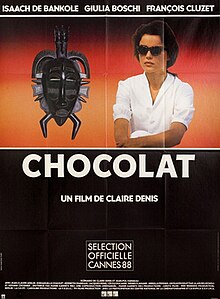Loading AI tools
1988 French film From Wikipedia, the free encyclopedia
Chocolat is a 1988 French period drama film written and directed by Claire Denis (in her directorial debut)[2] that follows a young girl who lives with her family in French Cameroon. Marc and Aimée Dalens (François Cluzet and Giulia Boschi) play the parents of protagonist France (Cécile Ducasse), who befriends Protée (Isaach de Bankolé), a Cameroonian who is the family's household servant.
| Chocolat | |
|---|---|
 Theatrical release poster | |
| Directed by | Claire Denis |
| Written by | Claire Denis Jean-Pol Fargeau |
| Produced by | Alain Belmondo Gérard Crosnier |
| Starring |
|
| Cinematography | Robert Alazraki |
| Edited by | Monica Coleman Claudine Merlin Sylvie Quester |
| Music by | Abdullah Ibrahim |
Release date |
|
Running time | 105 minutes |
| Countries | France Cameroon |
| Languages | French English |
| Box office | $2,344,286 (international)[1] |
Chocolat was entered into the 1988 Cannes Film Festival.[3] The film was critically received with largely positive notice.[4][5][6]
An adult woman named France walks down a road toward Douala, Cameroon. She is picked up by William J. Park, an African American who has moved to Africa and is driving to Limbe with his son. As they ride, France's mind drifts and we see her as a young girl in Mindif, French Cameroon in 1957, where her father was a colonial administrator.[7]
The story is told through the eyes of young France, showing her friendship with the "houseboy," Protée, as well as the sexual tension between Protée and her mother, Aimée. The conflict of the film comes from the discomfort created as France and her mother attempt to move past the established boundaries between themselves and the native Africans. This is brought to a head through Luc Segalen, a Western drifter who stays with the Dalens family after a small aircraft crashes nearby. He acknowledges Aimée's attraction to Protée in the presence of other black servants. This later results in a fight between Luc and Protée, which Protée wins. During the fight, Aimée sits nearby, unseen by the two. She attempts to seduce Protée after Luc has left but he rejects her advance. Aimée consequently asks her husband to remove him from the house. Protée is moved from his in-house job to working outdoors in the garage as a mechanic.
Towards the end of the film, France's father reveals a central theme of the film as he explains to her what the horizon is. He tells her that it is a line that is there but not there, a symbol for the boundaries that exist in the country between rich and poor, master and servant, white and black, coloniser and colonised, male and female; a line that is always visible but impossible to approach or pass.

The soundtrack, performed and recorded by Abdullah Ibrahim, was released in 1988 as Mindif.[8]
Seamless Wikipedia browsing. On steroids.
Every time you click a link to Wikipedia, Wiktionary or Wikiquote in your browser's search results, it will show the modern Wikiwand interface.
Wikiwand extension is a five stars, simple, with minimum permission required to keep your browsing private, safe and transparent.